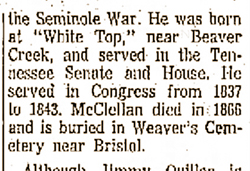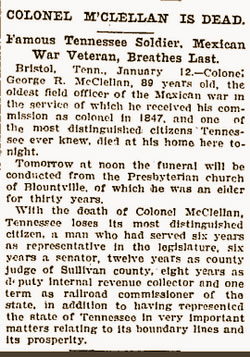Source: Historic Sullivan by Oliver Taylor (1906) - Transcribed by Tammy Clark
George R. McClellan was a ready soldier-the veteran of three enlistments in the army.
He was born on Beaver creek in 1815-was brought up on a farm and attended the best schools of the county, acquiring a good education. At the age of twelve he entered Washington College with the intention of completing his education, but there was a call for troops to aid in the removal of the Cherokees [!] from their eastern homes to the allotted lands in Indian Territory and he enlisted.
In 1847 there came another call for men and he mustered a company at Blountville. The best means of transportation in those days was by water, so he carried his company down the Mississippi to New Orleans, thence across the Gulf of Mexico. In this war he became colonel of the Fifth Tennessee volunteers and was much hard service, being in the battle of Chapultapec, where so many were killed and captured. He entered Mexico with the victorious forces under Gen. Scott.
When this war was over he returned and his regiment was honorably discharged at Memphis, July 28, 1848. At the time of his death Col. McClellan bore the distinction of being the last field-officer of the war.
In 1857 he was appointed, with Judge Samuel Milligan, a commissioner on the part of Tennessee to re-mark the boundary line between Tennessee and Virginia.
In 1859 he was elected state senator, which office he was filling at the beginning of the Civil War.
He enlisted again, organized the Fourth Tennessee cavalry and was in the battle of Greasy Cove. He was with Bragg at Knoxville and with Zollicoffer when that office was killed, rendering valuable service in restoring assurance among the men and escorting them to Nashville.
He then joined Gen. Forrest and took part in the Battle of Shiloh, 1862. When this battle was over he went with a detail of soldiers to gather up his wounded men. Coming across Capt. Gage of the Fifteenth Mississippi, in a dying condition, he gave orders: "Take this man over the hill and have him cared for by my surgeons." Upon examination it was found that a ball had struck a silk handkerchief which the captain carried in his pocket and had carried it entirely through one lung. Surgeons W.T. Delany and ______ Cate pulled out the handkerchief, bringing the ball with it, and succeeded in saving his life.
At the close of the war he retired to his farm, east of Blountville, broken in spirit and fortune.
A few years later he was chosen a member of the county court and was afterward elected chairman of the court, occupying the office a number of years.
He was enthusiastic over good roads and when state senator offered his influence in getting convict labor to build them. The suggestion resulted in a newspaper controversy between him and Rev. William Robeson, the latter opposing the us of convicts on grounds that made the movement unpopular, and it was therefore abandoned.
Gov. Marks appointed him one of the railroad commissioners of the state. During Cleveland's first Administration he was appointed deputy internal revenue collector.
While Col. McClellan cannot be ranked in the list of our greatest soldiers, he was a willing one. Whenever the county called for troops he answered, "here."
No man served longer or in more capacities in the public life of the county than he. He was born and reared-he lived and died a Sullivan County man.




